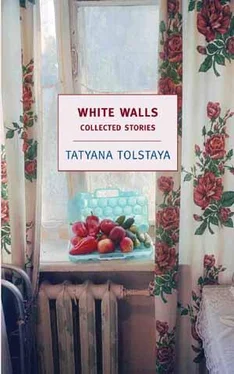Ahead was the market, spattered with booths. Twilight, twilight. Illuminated from inside were the icy windows of the booth where winter sells a snowy pulp covered with chocolate on a splintery stick and the colorful gingerbread house where you can buy various kinds of poisonous smoke and a folding spoon and chains of special very cheap gold; and the desired window where a group of black figures huddled, hearts warmed by happiness, and where a beery dawn glowed translucently with wandering flames in the thick glass of mugs. Vassily Mikhailovich got in line and looked around the snowy square.
There was Isolde, legs spread apart. She was blowing beer foam onto her cloth boots, horrible-looking, with a cracked drunken skull and red wrinkled face. Lights were coming on and the first stars were rising: white, blue, green. The icy wind came from the stars to the earth, stirring her uncovered hair, and after circling around her head, moved on to the dark doorways.
“Lyalya,” said Vassily Mikhailovich.
But she was laughing with new friends, stumbling, holding up her mug: a big man was opening a bottle, another man struck the edge of the counter with a dried fish, they were having a good time.
“My heart sings with joy,” Isolde sang. “Oh, if I could feel this way forever.”
Vassily Mikhailovich stood and listened to her sing without understanding the words and when he came to, a struggling Isolde was being led away by the militiamen. But that couldn’t be Isolde: she had passed away a long time ago.
And he, it seemed, was still alive. But now there was no point to it. Darkness pressed against his heart. The hour of departure had struck. He looked back one last time and saw only a long cold tunnel with icy walls, and himself, crawling with a hand extended, grimly smothering all the sparks that flashed on the way. The queue shoved him and hurried him, and he took a step forward, no longer feeling his legs, and he gratefully accepted from gentle hands his well-earned cup of hemlock.
Translated by Antonina W. Bouis
HIS WIFE fell asleep the minute she lay down on the couch in the nursery: nothing wears you out as much as a sick child. Good, let her sleep there. Ignatiev covered her with a light blanket, stood around, looked at her open mouth, exhausted face, the black roots of her hair—she had stopped pretending to be a blonde a long time ago—felt sorry for her, for the wan, white, and sweaty Valerik, for himself, left, went to bed, and lay without sleep, staring at the ceiling.
Depression came to Ignatiev every night. Heavy, confusing, with lowered head, it sat on the edge of the bed and took his hand—a sad sitter for a hopeless patient. And they spent hours in silence, holding hands.
The house rustled at night, shuddered, lived. There were peaks in the vague din—a dog’s bark, a snatch of music, the thud of the elevator going up and down on a thread—the night boat. Hand in hand with depression Ignatiev said nothing: locked in his heart, gardens, seas, and cities tumbled; Ignatiev was their master, they were born with him, and with him they were doomed to dissolve into nonbeing. My poor world, your master has been conquered by depression. Inhabitants, color the sky in twilight, sit on the stone thresholds of abandoned houses, drop your hands, lower your heads: your good king is ill. Lepers, walk the deserted streets, ring your brass bells, carry the bad tidings: brothers, depression is coming to the cities. The hearths are abandoned and the ashes are cold and grass is growing between the slabs where the bazaar once was boisterous. Soon the low red moon will rise in the inky sky, and the first wolf will come out of the ruins, raise its head, and howl, sending a lone call on high, into the icy expanses, to the distant blue wolves sitting on branches in the black groves of alien universes.
Ignatiev did not know how to cry, and so he smoked. The light glowed in tiny toy flashes of summer lightning. Ignatiev lay there, depressed, tasting tobacco bitterness and knowing that in it was truth. Bitterness, smoke, a tiny oasis of light in the dark—that was the world. On the other side of the wall the plumbing rumbled. His earthy, tired, dear wife slept under a torn blanket. White Valerik was restless—thin, sickly shoot, pathetic to the point of spasms—rash, glands, dark circles under his eyes. And somewhere in the city, in one of the brightly lit windows, unfaithful, unsteady, evasive Anastasia was drinking wine with someone else. Look at me… but she just laughs and looks away.
Ignatiev turned on his side. Depression moved closer to him and flung up her ghostly sleeve—a line of ships floated up. The sailors were drinking with the locals in taverns, the captain stayed late on the governor’s veranda (cigars, liqueurs, pet parrot), the watch man left his post for a cockfight and to see the bearded woman at the motley sideshow; the painters quietly untied themselves, a night breeze came up, and the old sailing ships, creaking, left the harbor for points unknown. Sick children, small, trusting boys, sleep soundly in their berths; they snuffle, holding a toy tight in their fists; the blankets slip off, the empty decks sway, the flock of ships sails with a soft splash into the impenetrable dark, and the pointed wake smooths out on the warm black surface.
Depression waves a sleeve and spreads out a boundless stony desert—hoarfrost shining on the cold rocky plain, stars frozen indifferently, the white moon indifferently drawing circles, the steadily stepping camel’s bridle jangling sadly, a rider drawing near, wrapped in chilled striped cloth of Bukhara. Who are you, rider? Why have you dropped your reins? Why have you wrapped up your face? Let me loosen your stiff fingers. What is this, rider, are you dead?… The rider’s mouth gapes, a bottomless pit; his hair is tangled, and deep sorrowful gutters have been etched in his cheeks by tears flowing for millennia.
A flutter of the sleeve. Anastasia, floating lights over a swamp. What was that slurp in the thicket? Don’t look back. A hot flower beckons you to step on the springy brown hummocks. A thin, impatient fog moves about, sometimes lying down, sometimes hanging over the kindly beckoning moss: the red flower floats, winking through the white clumps: come here, come here. One step—that’s not scary, is it? One more step— you’re not afraid, are you? Shaggy heads stand in the moss, smiling, winking. A noisy dawn. Don’t be afraid, the sun won’t rise. Don’t be afraid, we still have the fog. Step. Step. Step. Floating, laughing, the flower flashes. Don’t look back! I think I’ll get it. I do think I’ll get it. I will. Step.
“Oo-oo-oo,” came a groan from the next room. Ignatiev pushed through the door in a bound and rushed to the crib— what’s the matter, what is it? His tangled wife jumped up and they began jerking at Valerik’s sheets and blanket, getting in each other’s way. Just to do something, to act! The little white head tossed and turned in its sleep, muttered, ba-da-da, ba-da-da. Rapidly muttering, pushing them away with his hands; then he calmed down, turned, settled down—He went off into his dreams alone, without his mother, without me, down the narrow path under the pines.
“What’s the matter with him?”
“Another fever. I’ll sleep here.”
“I’ve already brought you a blanket. I’ll get you a pillow.”
“He’ll be like that till morning. Shut the door. If you want to eat, there are some cheese pastries.”
“I’m not hungry. Get some sleep.”
Depression was waiting, lying in the wide bed; moved over, made room for Ignatiev, embraced him, put her head on his chest, on the razed gardens, the dried-up seas, the ashen cities.
But not everything was killed: toward morning, when Ignatiev slept, Life came out of the dugouts; it pulled apart the burned logs and planted small seedlings: plastic primroses, cardboard oaks; hauled building blocks to erect temporary shelter, filled the seas with a watering can, cut pink bug-eyed crabs out of oilcloth, and with an ordinary pencil drew the dark, convoluted line of the surf.
Читать дальше












